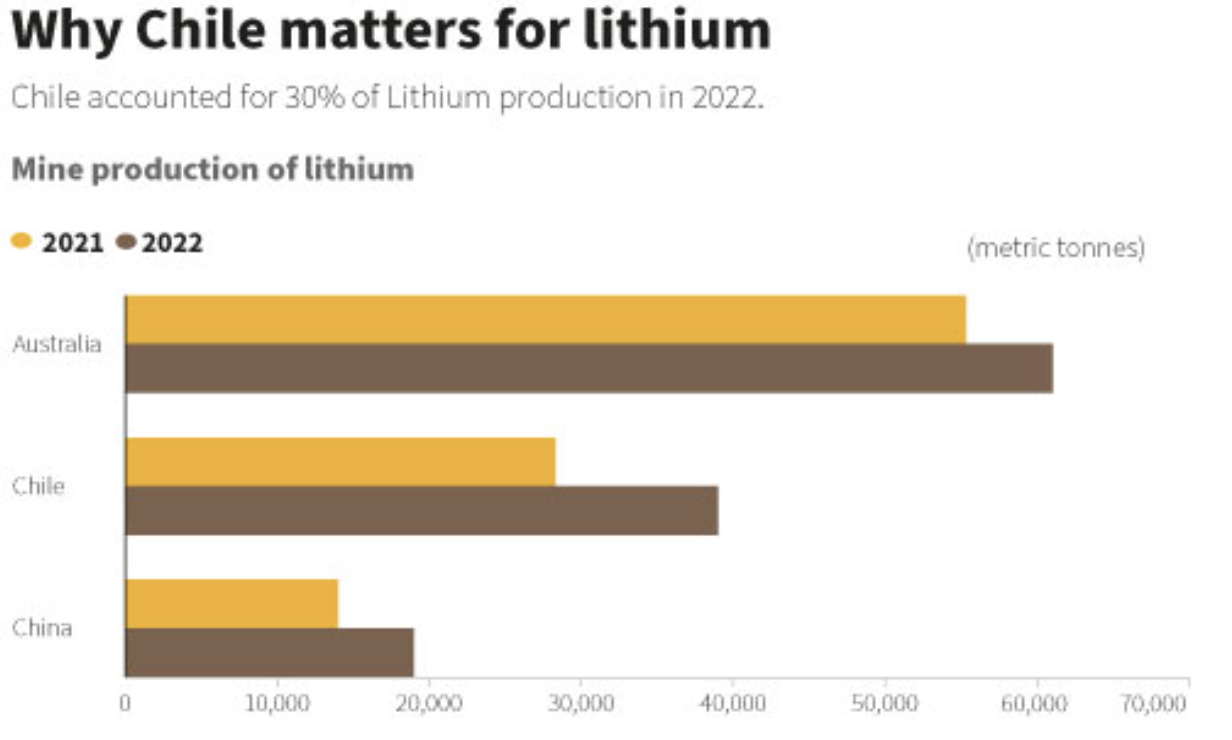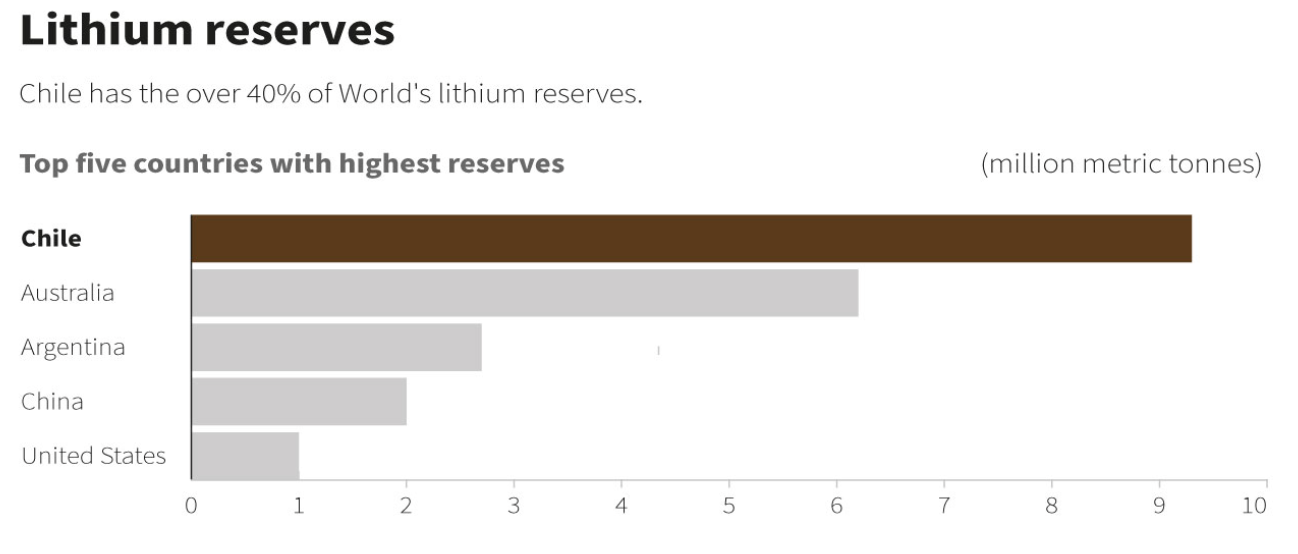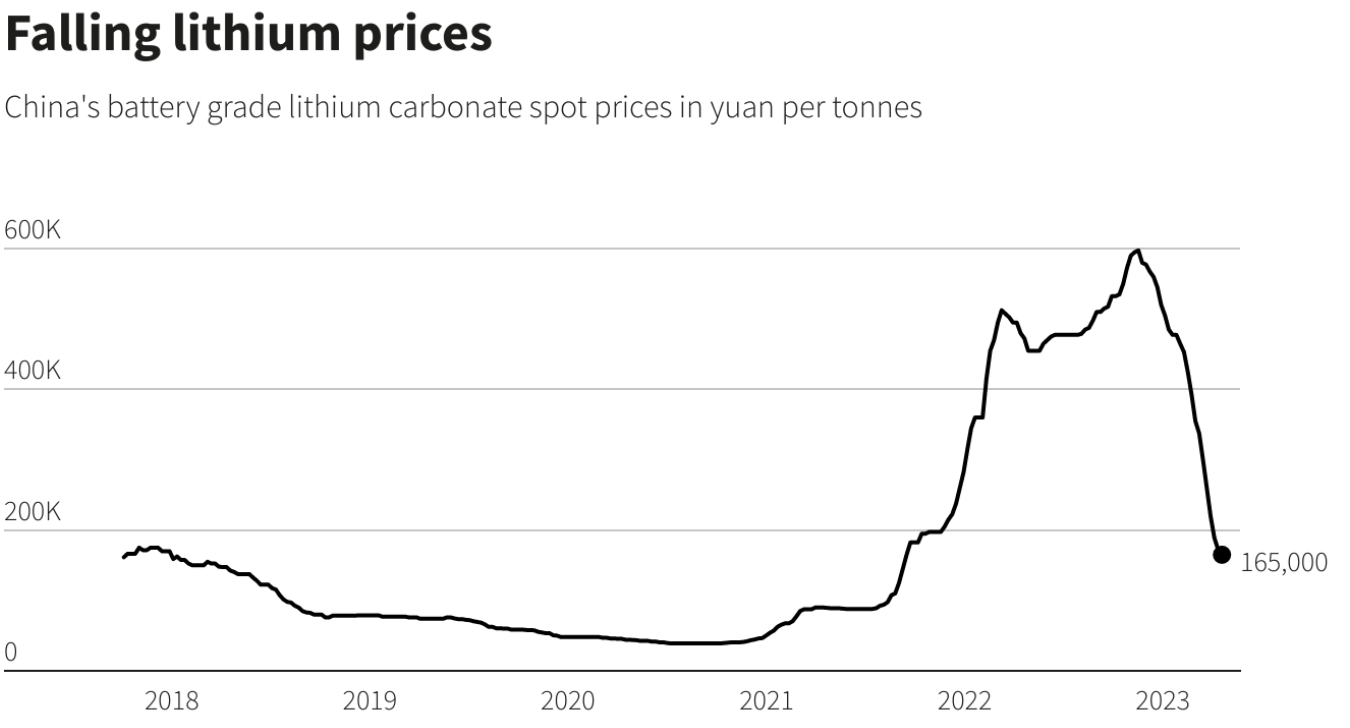Chile’s liberal President Gabriel Boric recently announced he would nationalize the country’s lithium industry–an essential metal in electric vehicle battery production, despite it being voted down last year. Chile is the world’s second-largest producer of lithium and host to the world’s largest lithium reserves. In time, Chile would transfer control of its lithium operations from SQM and Albemarle to a separate state-owned company. Chile will be joining Mexico, who nationalized its lithium deposits last year, and Indonesia, who banned exports of nickel ore, another key battery material, in 2020. Mexico is also working with Chile, Argentina, and Bolivia to create a lithium association so the countries, which together account for more than half the world’s reserves, can share their expertise.

According to President Boric, future lithium contracts would only be issued as public-private partnerships with state control. Chile’s government would not terminate current contracts, but he hopes that the contract owners would be open to state participation before the contracts expire. Albemarle and SQM are the world’s No.1 and No.2 lithium producers respectively, whose contracts in Chile are set to expire in 2030 (SQM) and in 2043 (Albemarle). SQM, formally called Sociedad Quimica Y Minera de Chile, and Albemarle supply Tesla, LG Energy Solution Ltd and other EV and battery manufacturers.

State-owned Codelco, the world’s largest copper producer, will be tasked to find the best way forward for a state-owned lithium company. President Boric will seek approval from Congress for the plan in the second half of the year, but Chile’s Congress does not always grant approval for Boric’s projects. Chile’s Congress shelved a proposed tax reform bill in early March that was introduced last July by Chile’s finance minister. The tax reform bill would have increased copper mining royalties on companies that produce more than 50,000 metric tons a year.
Codelco and state miner Enami will be given exploration and extraction contracts in areas where there are now private projects before the national lithium company is formed. A division will be dedicated to advancing technology to minimize environmental impacts, including favoring direct lithium extraction over evaporation ponds.
Boric Is Planning on Technological Innovation
According to President Boric, the new state-owned company would work to slash the environmental impacts of lithium production by shifting away from evaporation ponds, traditionally used to remove the metal from brine, in favor of direct lithium extraction (DLE)–an emerging and unproven set of filtration technologies aimed at revolutionizing how lithium is produced. DLE technologies are designed to extract the metal from salty brines using filters, membranes, ceramic beads or other equipment that can typically be housed in a small warehouse. The hope of DLE is to boost global lithium production by using a smaller environmental footprint than open-pit mines and evaporation ponds that are often as large as multiple football fields and are unpopular with local communities. However, many DLE technologies use a great deal of potable water and electricity.
Lithium Prices
Lithium prices have dropped more than 70 percent from a November peak due to weakening EV demand in China–the world’s biggest auto market. China’s EV market faced slowing demand after it cut subsidies to the sector this year. Electric vehicles are also facing competition from conventional vehicles after carmakers, including SAIC Volkswagen Automotive Co and Geely Automobile, slashed prices on more than 40 brands. China’s plans for a stricter auto emissions standard effective July 1 has added pressure to automakers and dealers to clear inventories of vehicles that do not meet the standard. The price war in China’s car market, escalating from electric vehicles to internal-combustion-engine vehicles, will potentially last through the second quarter, with the entire supply chain likely to face profit losses this year. Waning demand for electric vehicles in recent months is being exacerbated by mounting supplies of lithium with available stocks in the tens of thousands of metric tons, compared with barely any stocks in the market last year. In U.S. dollars, lithium prices are around $25,000 per metric ton today compared to a high of over $80,000 a metric ton last year.

Global Lithium Production
Australia is the world’s biggest supplier of lithium, producing it from hard rock mines. Argentina, Chile and China mainly produce it from salt lakes, i.e. brine mines. In 2022, world output was 737,000 metric tons of Lithium Carbonate Equivalent (LCE) and it is expected to reach 964,000 metric tons in 2023 and 1,167,000 metric tons in 2024 with rapid growth coming from Australia, Chile and Argentina.
China has over half of the world’s lithium refining capacity but has to rely on imports for about two-thirds of the raw material. China accounts for 8 percent of the world’s lithium reserves, which are mostly held in an igneous rock called spodumene and in saltwater lakes. Chinese-controlled lithium mines, including those in Africa, are expected to increase output to 705,000 tons by 2025, from 194,000 tons in 2022—almost quadrupling the amount of its global supply and lifting China’s share to 32 percent of the world’s supply, up from 24 percent last year.
Chinese lithium mining is increasing its use of lithium derived from lepidolite–a lithium-bearing rock often considered poor quality and environmentally unsound because of its low yield and high energy costs. For every ton of lithium carbonate equivalent processed from lepidolite, 200 tons of waste are produced that needs treating and disposal. Because of China’s cheap coal generation and huge coal generation capacity, however, it has ample energy to process the material. Lepidolite is expected to help increase China’s lithium yield to 280,000 tons in 2025—13 percent of global supply–up from 88,000 tons last year.
Conclusion
Last year, a constitutional assembly in Chile rejected plans to nationalize parts of the country’s mining industry. The proposal, known as article 27, would have given the state exclusive mining rights over lithium, rare-earth metals and hydrocarbons and a majority stake in copper mines. Now, President Boric is again planning to nationalize the lithium industry as the current private contracts run out and hoping to work the state-owned company in with the private concerns over time. In controlling the industry, Boric wants to lessen the industry’s environmental footprint by turning to an emerging and unproven technology, DLE.
Lithium prices have dropped significantly since last November as China’s demand for electric vehicles has waned and stocks of lithium have grown. Nonetheless, there will be competition in the lithium market as Western governments push electric vehicles upon their people to supposedly reduce greenhouse gas emissions. In reality, the EV push is only helping China to gain a greater economic hold as its dominates the EV battery supply chain.



